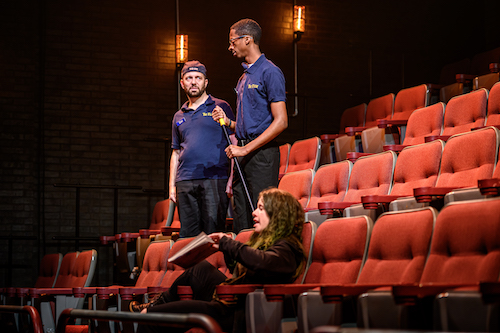
‘The Flick’ is “captivating, funny, and real”.
It’s true that, for the three-hour-and-fifteen-minute running time of Outside the March’s production of Annie Baker’s Pulitzer Prize-winning The Flick, not very much actually happens. It’s also true that, were its characters working those three hours, each of their paycheques, minimum wage in Massachusetts, would total only about $25.
Baker’s play, dealing in empty space, desultory popcorn-sweeping, and freewheeling conversations, details the interactions between three employees at one of the last theatres to use 35mm film projectors instead of going digital. Not much happens, and yet, it’s a genuinely thrilling theatre experience that deals humanely and sensitively with the kind of people whose lives never appear on the big screen.
Sam (Colin Doyle), in his mid-thirties, is a minimum-wage lifer whose even minor aspirations of becoming a projectionist or finding romance are consistently thwarted. Desperate to exert what little authority he has over his domain, he finds nothing so depressing as the question, “what do you want to be when you grow up?” Rose (Amy Keating), the projectionist, has oppressive student loans and a laissez-faire, hedonistic approach to life that masks her deeper fears.
Into their lives comes Avery (Durae McFarlane), a young, socially awkward, upper-middle-class black college student on a break from school. A Six Degrees of Kevin Bacon savant, his intense passion for film is only rivaled by his intense discomfort with other human beings. He’d rather be watching a movie of life than living it.
The pitch-perfect lobby space by Anahita Dehbonehie and the set designed by Nick Blais turn Streetcar Crowsnest into a movie theatre for the evening, complete with blinking lights, parody movie posters, and shiny concessions cases. Visually, it’s as much of a treat as the glossy Junior Mints on display.
The audience sits where the screen would be, confronted with its mirror onstage: an empty, post-screening theatre auditorium, with rows of semi-shabby chairs, and a cleverly-lit projection booth overhead. (The cushy movie chairs begin to look particularly inviting around the two-and-a-half-hour mark.) Scenes are broken up by a THX-approved soundtrack (Richard Feren), and in a particularly nice touch, the movie posters in the back hall change to mark the passage of time.
Director Mitchell Cushman lends an agreeably shaggy, naturalistic feel to the show’s pacing, and the actors gleefully lean in to the sense that we’re just watching time pass. They banter with each other, suffer through excruciating, charged silences, and try to navigate life and soda-sticky floors in equal measure. When something does happen, like Keating’s wonderfully hilarious post-work party dance or an exceptionally mortifying flirtation, it happens in its entirety (no montage techniques allowed here) and feels like a lightning bolt.
It could be boring, and definitely isn’t for everyone. But I was captivated the whole time, because it’s also very funny and real, and each character reveals many layers; in particular, McFarlane’s Avery is a wonderfully complex creation, alternating a soft, anxious stutter with the preternatural calm of a person used to being stereotyped.
Doyle’s intensifying attempts to hide his rage as his life tunnels to a single point manifest effectively in his physical actions, from how he chases spilled concessions with increasing mania to a defeated flop into a chair, staring blankly at the blank screen staring back.
Rose is the least-developed character, and Keating’s forceful swagger sometimes accentuates the character’s Manic Pixie Dream Girl trappings, but her response to the narrative’s seeming attempt to force her into a romantic-comedy plot is surprising and a satisfying rejection of the trope.
The play asks ethical questions involving race, class, and our actions under a capitalist society where technology advances relentlessly while worker’s rights stagnate. It takes sexual assault and suicidal depression and buries them under a heap of spilled popcorn with artificial butter flavouring. My guest said, “it’s a long time to marinate in loserdom,” and that’s true; the show demands a lot from its audience emotionally in a long and sustained way, but is also very rewarding.
Author Mark Haddon wrote that the hallmark of literary fiction is that it deals with “desperately limited lives” with great empathy. Jane Austen’s heroines may not seem to have much in common with the low-wage losers of Baker’s play, but the conceit is the same: stuck in social constraints and an oppressive class system, they are attempting to make the best of the situation with a sort of wounded grace.
The Flick takes an escapist medium and turns it into an anti-escape from reality. Where will you be when the lights come back up?
Details
- The Flick plays at the Streetcar Crowsnest Guloien Theatre (345 Carlaw Avenue) until November 2, 2019.
- Shows run at 7:30PM Tuesday-Saturday, with 2:00PM matinees Saturday, Sunday, and select Wednesdays.
- Tickets are $30-55 and can be purchased online or by calling (647) 341-7390 ext. 1010
- Warnings: The show includes hazer, mature themes and sexual content.
Photo of Colin Doyle, Durae McFarlane, and Amy Keating by Dahlia Katz
